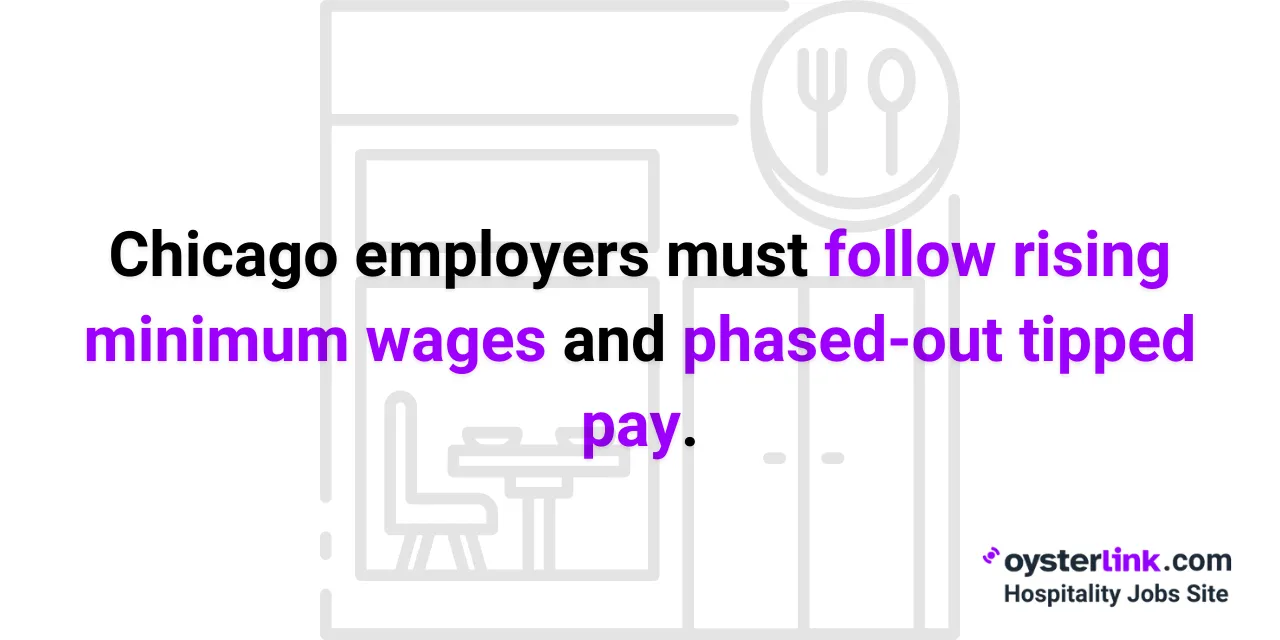Hiring a Chef in Chicago demands understanding local wage laws and offering competitive compensation.
This guide shares key requirements and practical tips to attract top culinary talent effectively.
Understanding Chef Hiring Requirements in Chicago
Employers in Chicago must comply with specific wage laws when hiring Chefs.
As of July 1, 2025, the city’s minimum wage is $16.60 per hour for establishments with four or more employees.
Additionally, Chicago is phasing out subminimum wages for tipped employees.

Starting July 1, 2024, the base pay for tipped workers will increase by 8% annually until 2028, when the full minimum wage applies.
This means Chefs who receive tips must be compensated accordingly, ensuring adherence to minimum wage protections.
Compliance with the Fair Workweek Ordinance
The Chicago Fair Workweek Ordinance mandates predictable scheduling and compensation for last-minute changes.
This ordinance covers food service workers earning up to $32.60 per hour or an annual salary up to $62,561.90.
Employers must provide schedules at least 10 days in advance and compensate for any schedule changes made less than 7 days before the shift, which affects Chef scheduling and payroll practices.
For further guidance on hiring staff and managing workforce compliance, see our recruitment hospitality job posting compliance resource.
Competitive Wage Structure for Chefs in Chicago
The average hourly wage for chefs in Chicago is approximately $27.38, about 40% higher than the national average, underscoring the city’s competitive culinary labor market.
Head Chefs earn an average annual salary of $69,503, which is roughly 8% above the national average for this role.
Private Chefs command even higher wages, averaging $39.57 an hour, roughly 22% more than the national average, reflecting their specialized skill set and clientele.
For details on the Chef role, responsibilities and career outlook, visit the Chef job description page.
To advance your hiring strategy, check out our how to hire top Chef for your kitchen article.
Effective Interview Tips When Hiring a Chef in Chicago
Effective interviews help you evaluate a Chef’s skills, leadership and legal compliance.

1. Define Clear Job Requirements
Begin by articulating the chef’s responsibilities, including experience level, cuisine expertise, leadership capacity and any certification needed.
Clear requirements attract qualified candidates and streamline the screening process.
Creating an effective job description can be accelerated by using our guide to create restaurant job description fast results.
2. Utilize Multiple Recruitment Channels
Post job openings on culinary-specific job boards and leverage social media platforms and professional networks, broadening outreach to high-quality Chefs.
Discover social media strategies for hospitality recruitment in our feature on how restaurants use social media to recruit top talent.
3. Screen Candidates and Conduct Practical Assessments
Interview candidates to assess technical skills, leadership style, and cultural fit.
Ask targeted questions like, “How do you manage food costs while ensuring quality?” to gauge problem-solving skills.
Arrange a working interview or practical test to observe culinary skills, efficiency, hygiene standards and teamwork in action.
4. Verify References and Offer Competitive Packages
Contact previous employers to confirm the candidate’s reliability, professionalism, and leadership qualities.
Offer salaries that meet or exceed the city’s minimum wage and reflect the candidate’s expertise.
Also, include benefits such as health insurance and opportunities for professional growth to enhance job appeal.
Additional interview preparation tips are available at our Chef interview questions page, supporting employers in selecting the best talent.
Key Points To Remember about Chef Wages in Chicago
- Minimum wage rules must be strictly followed to avoid legal penalties.
- Progressive increases to tipped employee wages must be planned for, affecting payroll budgeting.
- Competitive wages are essential in retaining experienced chefs in the local market.
Retaining skilled Chefs is crucial. Learn from our insights on retaining a Chef effectively in competitive markets.
Resources for Chef Hiring and Wage Compliance in Chicago
- City of Chicago Minimum Wage Information
- City of Chicago Fair Workweek Ordinance
- Cook County Minimum Wage Ordinance
How To Hire a Chef in Chicago: Conclusion
Hiring a Chef in Chicago requires careful attention to local wage laws, the Fair Workweek Ordinance and competitive compensation strategies.
By clearly defining job roles, leveraging multiple recruitment channels, rigorously assessing candidates and offering fair wages and benefits, employers can secure top culinary talent and maintain compliance with regulations.
Gain further inspiration for culinary leadership and career advancement at the Executive Chef vs Chef de Cuisine differences feature.








Loading comments...